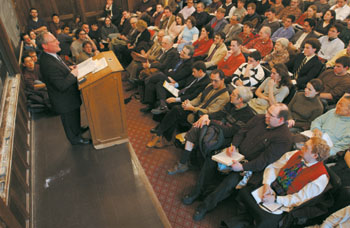 |
|
|
The world seen through Kristol The ’90s ended on September 11, 2001,” says William Kristol, editor of the Weekly Standard. Addressing a packed Social Sciences lecture hall February 18, Kristol offers a conservative take on how the American foreign-policy debate has changed since the terrorist attacks. Kristol begins his talk, part of the John M. Olin Center for Inquiry into the Theory and Practice of Democracy’s Politics and Ethics lecture series, with an inside joke: Referring to recent chatter about whether or not President Bush is a follower of Leo Strauss (or if pundits misinterpret the classicist philosopher who taught at Chicago from 1949 to 1967), Kristol says, “This is a terrible injustice to President Bush. I’m sure late at night in the Oval Office he’s poring over [Strauss’s works].”
Kristol then introduces his three main talking points: the September 11 terrorist attacks as the start of a new era, Bush’s post-9/11 foreign policy, and the 2004 elections. From era to era “things change a lot, things change unpredictably, and things change more than you think they’re going to.” September 11, he says, transformed U.S. relations with Europe, its attitude toward the Israeli-Palestinian conflict, and other international issues. Today’s political landscape, he argues, parallels that of the early Cold War: President Truman, like Bush, “expected to be a domestic-policy president.” Back in the October 2000 Bush-Gore debates, Kristol notes, terror, Al Qaeda, and other post-9/11 hot topics were missing. Bush’s foreign-policy plan was far from interventionist and nearly identical to Gore’s, except that “Bush said he thought we should be humble abroad—it’s a strange idea of humility, it turned out.” Indeed, the Republican candidate was “hostile to nation-building and peace-keeping” in 2000. “I’m worried,” Bush said in one debate, “about overcommitting the military around the world.” Since 9/11, Kristol says, five issues have shaped Bush’s foreign policy: terror, the regimes that harbor terrorists, weapons of mass destruction, democracy and American leadership, and the Middle East. After the attacks Bush decided that the Middle East “couldn’t go on the way it was going”—with nations aiding terrorists and building or looking to build WMDs—despite the region’s “surface stability.” Bush emphasized regime change as the “single best thing you can do” to promote liberal democracy worldwide, Kristol says, a policy that reached a climax when the United States invaded Iraq. Although critics call U.S. actions abroad excessive, Kristol defends Bush’s choices. “The problem of the ’90s is not—and the problem of the future is not—that America is too strong too overbearing, too arrogant. The problem of the ’90s was—and the problem of the future will be—that America will be too hesitant and too timid, too slow to intervene” in countries where leaders slaughter their own people, build weapons of mass destruction, or plan to attack the United States. “Liberal democracies like America do not eagerly go to war.” The new foreign policy, Kristol argues, requires institutional change. The United States is “running a post-9/11 Bush foreign policy with a ’90s-size military, a ’90s-capability public diplomacy, a ’90s-capability intelligence network,” he says. But Bush, he concedes, must do a better job justifying such investments to the American people. Looking to the 2004 elections, Kristol wonders, will the nation be “saved by John Kerry,” driving the “University of Chicago–inspired lunatics out of the White House?” A Democratic foreign-policy approach, he says, remains unclear: “Who knows what [Kerry] would do about Iraq?” Kristol emphasizes the need to look forward rather than back. “The biggest mistake is to assume that we’ll get over this moment and that we’ll revert back to the world of September 10, the ’90s as the norm,” he says. “We’re in a new world.” As Kristol sees it, that new world needs another four years of Bush.—P.M.
|
|
phone: 773/702-2163 | fax: 773/702-8836 | uchicago-magazine@uchicago.edu


